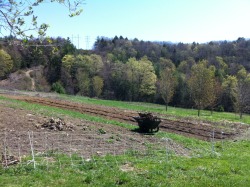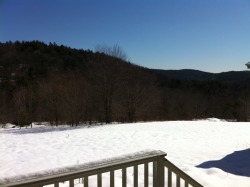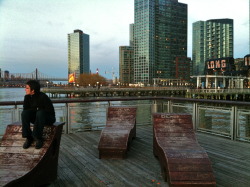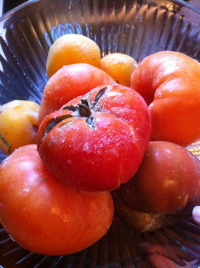 Freshly prepped garden bedI'm learning more and more about myself as life continues to unfold. I suppose that's good news. I mean, isn't that what folks mean by "life-long learning"?!
Freshly prepped garden bedI'm learning more and more about myself as life continues to unfold. I suppose that's good news. I mean, isn't that what folks mean by "life-long learning"?!
I'm especially discovering some of my less attractive qualities. Did you know that I can be surprisingly stubborn? Well, I can be. And did you know that I really don't like asking for help? Well, apparently I don't. And that I have a hard time letting go of a plan, once it's put in motion?
If I'm not careful, I can work myself to exhaustion.
Let me tell you about this past week.
After a few weeks of intermittent rain and cool weather, we finally had a long stretch of sunny, warm days. I was determined to make the most of it. Six full days of outdoor work. That's a lot, after a pretty quiet, sedentary winter, and only a few days really working in the garden since April 1. I bought and spread amendments, learned how to use a push tractor, tilled up two big patches, hauled many, many wheelbarrows-full of compost around, dug out about 400 row feet of mounded beds, planted 150 brassicas and 72 lettuces, and sheet mulched a 15x15 area around an apple tree. I had a lot of help, thank goodness! But for most of the time, it was me and the garden.
What I learned over the course of this week is that I like to set goals--over and over again, I created a benchmark, and then once I reached it, I set a new one. As each day wore on, the benchmarks grew smaller and smaller, as I ran out of energy, like a top spinning down, slower and slower. I'd start out by saying, "Ok. Let's dig out four lettuce beds, plant the lettuces, and then till the onion bed and amend it, and then plant the onions." By the end of the day, I could be heard to mutter, "Just one more load of compost. Just get the compost, and spread it on the bed."
I'm sure I made quite a sight, grunting and growling as I struggled to push an over-full wheelbarrow (it's one of those deep, heavy duty, super-big kinds) up a slight incline through tall grass. It just didn't want to budge. And I didn't have any more arm strength to pull it. So with sheer teeth-gritting determination and a lot of noise, using my hips and my whole body weight like a force of nature, I eventually made it up over the "hill." When Suzi, a friend of the farm, offered to push the tiller out of the garden for me, I was surprised to find just how resistant I was. Even though I barely had enough energy to direct the tiller, I couldn't let go and let someone else do it for me.
The downside of this kind of determination and stubbornness is that I wore myself out. The next day I went to farm down at my friend Leslie's. I'm spending one day a week working in her garden, gleaning as much as I can from her farming experience. And I could barely lift a shovel for more than a few minutes before I'd need to rest. And each time I bent down to plant, my back and my knees creaked. And my hands were stiff and sore... I was disappointed that I didn't ration my energy better, so that I could put in a good day's work with Leslie; toward the end of the day, I went off to the greenhouse to do transplanting, where I could sit and still be productive.
It reminds me of an experience I had on an Outward Bound trip, when I was about 20. I spent three weeks hiking in Colorado mountains with a group of about 10 other young people, and it was hard work, but amazing. About half-way through the trip, I developed an uncomfortable twinge in my knee, and when we stopped to re-stock our (60lb!) backpacks with food and supplies, the doctor there cautioned me to take it easy. I wanted so much to participate in all the activities, and I didn't want to be seen as weak . . . so I kept pushing myself, asserting that I could do more, willing it to be so. Well, the trip guides asked me the night before we made our ascent up to the highest peak of the trip if I was really prepared to go all the way, and I should have backed out. But I didn't, stubbornly refusing to listen to my body and wanting to be just as strong as everyone else. The morning of our ascent, we woke at 4, packed up and began moving at first light, but after just an hour or so, I could see that the terrain was going to be too difficult. And so I had to turn around, and someone, I can't remember who, had to accompany me back to base camp, forfeiting their own climb. Not being satisfied with good enough, I overstepped, and that had repercussions for the people surrounding me.
Good enough. This is the key phrase I need to remember. I have to learn to be satisfied, when I know I've done as much as I can do. Maybe it's the case that I'd like to be stronger, more fit, able to do more, be more experienced and able to plan my time better. (I didn't account for having to weed out quack-grass for 2 hours, and that threw EVERYTHING off!) But given all those wishes, I have to learn to be satisfied with the results when I know that I honestly have done my best. I couldn't have done any more. And so it must be good enough.
I have to remember that farming, like many things, is really about the long haul. It doesn't do me any good to work myself so hard one day that I can't get out of bed the next. The garden is teaching me to recognize my less-attractive tendencies: bullheadedness, compulsive overwork, not recognizing limits, lack of groundedness in my own body's wisdom.
It's been a huge week for the garden, and a pretty big week for me, too.







